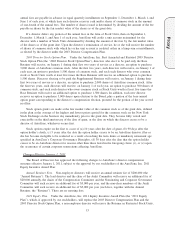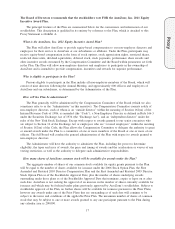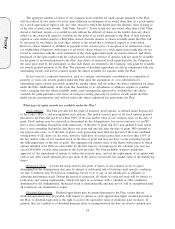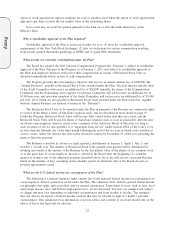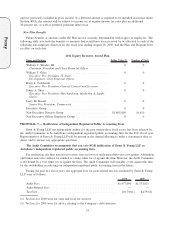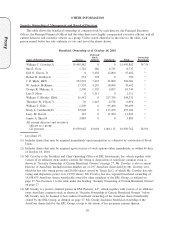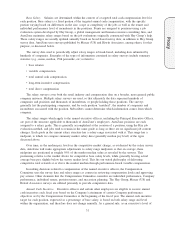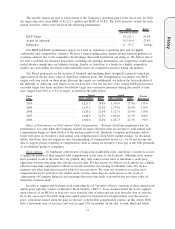AutoZone 2010 Annual Report Download - page 33
Download and view the complete annual report
Please find page 33 of the 2010 AutoZone annual report below. You can navigate through the pages in the report by either clicking on the pages listed below, or by using the keyword search tool below to find specific information within the annual report.
With respect to nonqualified stock options, AutoZone is generally entitled to deduct and the optionee
recognizes taxable income in an amount equal to the difference between the option exercise price and the fair
market value of the shares at the time of exercise. A participant receiving ISOs will not recognize taxable
income upon grant. Additionally, if applicable holding period requirements are met, the participant will not
recognize taxable income at the time of exercise. However, the excess of the fair market value of our common
stock received over the option price is an item of tax preference income potentially subject to the alternative
minimum tax. If stock acquired upon exercise of an ISO is held for a minimum of two years from the date of
grant and one year from the date of exercise, the gain or loss (in an amount equal to the difference between
the fair market value on the date of sale and the exercise price) upon disposition of the stock will be treated as
a long-term capital gain or loss, and we will not be entitled to any deduction. If the holding period
requirements are not met, the ISO will be treated as one that does not meet the requirements of the Code for
ISOs and the tax consequences described for nonqualified stock options will apply.
The current federal income tax consequences of other awards authorized under the Plan generally follow
certain basic patterns: stock appreciation rights are taxed and deductible in substantially the same manner as
nonqualified stock options; nontransferable restricted stock subject to a substantial risk of forfeiture results in
income recognition equal to the excess of the fair market value over the price paid, if any, only at the time the
restrictions lapse (unless the recipient elects to accelerate recognition as of the date of grant through a
Section 83(b) election); restricted stock units, stock-based performance awards, dividend equivalents, other
incentive awards and other types of awards are generally subject to tax at the time of payment. Compensation
otherwise effectively deferred is taxed when paid. In each of the foregoing cases, AutoZone will generally
have a corresponding deduction at the time the participant recognizes income, subject to Section 162(m) of the
Code with respect to “covered employees.”
Section 162(m) of the Code. Section 162(m) of the Code denies a deduction to any publicly held
corporation for compensation paid to certain “covered employees” in a taxable year to the extent that
compensation to such covered employee exceeds $1 million. It is possible that compensation attributable to
awards under the Plan, when combined with all other types of compensation received by a covered employee
from us, may cause this limitation to be exceeded in any particular year.
Certain kinds of compensation, including QPBC, are disregarded for purposes of the deduction limitation.
In accordance with Treasury Regulations issued under Section 162(m) of the Code, compensation attributable
to stock awards will generally qualify as performance-based compensation if (1) the award is granted by a
compensation committee composed solely of two or more “outside directors,” (2) the plan contains a per-
employee limitation on the number of awards which may be granted during a specified period, (3) the plan is
approved by the stockholders, and (4) under the terms of the award, the amount of compensation an employee
could receive is based solely on an increase in the value of the stock after the date of the grant (which requires
that the exercise price of the option is not less than the fair market value of the stock on the date of grant),
and for awards other than options, established performance criteria that must be met before the award actually
will vest or be paid.
The Plan is designed to meet the requirements of Section 162(m) of the Code; however, full value awards
granted under the Plan will only be treated as qualified performance-based compensation under Section 162(m)
of the Code if the full value awards and the procedures associated with them comply with all other
requirements of Section 162(m) of the Code. There can be no assurance that compensation attributable to
awards granted under the Plan will be treated as qualified performance-based compensation under Sec-
tion 162(m) of the Code and thus be deductible to us.
Section 409A of the Code. Certain awards under the Plan may be considered “nonqualified deferred
compensation” subject to Section 409A of the Code, which imposes additional requirements on the payment
of deferred compensation. Generally, if at any time during a taxable year a nonqualified deferred compensation
plan fails to meet the requirements of Section 409A, or is not operated in accordance with those requirements,
all amounts deferred under the nonqualified deferred compensation plan for the current taxable year and all
preceding taxable years, by or for any participant with respect to whom the failure relates, are includible in the
gross income of the participant for the taxable year to the extent not subject to a substantial risk of forfeiture
23
Proxy




